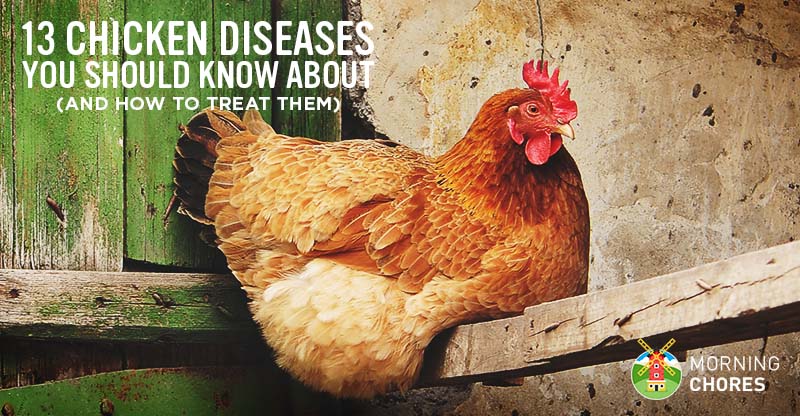Poultry are constantly suffering from diseases that can spread at high speed if they live in colonies, so proper vaccination of birds against the most common diseases in domestic birds is practical.
On the other hand, the hygiene of the facilities is essential to fight diseases and parasites, and strict veterinary control is absolutely necessary to deal with a possible outbreak of disease.
In this Animal Expert article, we show you the most common diseases in poultry, read on and find out!
Infectious bronchitis is caused by a coronavirus that only affects chickens and chickens; the main symptoms are respiratory problems (wheezing, hoarseness), runny nose and watery eyes; spreads through the air and completes its cycle in 10 to 15 days.
This common disease in poultry can be prevented with vaccines; otherwise, it is difficult to attack this disease.
Avian cholera is a highly contagious disease that attacks several species of birds and a bacterium (Pasteurella multocida) is the cause of this disease.
Sudden death of seemingly healthy birds is the hallmark of this serious disease, another symptom is that birds stop eating and drinking, the pathology is transmitted by contact between sick and healthy birds, the outbreak occurs between 4 and 9 days after contracting the disease.
Disinfection of facilities and equipment, as well as treatment with sulfas and bacterinas, is absolutely necessary.The corpses should be removed immediately to prevent other birds from pinging and infecting.
Infectious coriza is produced by a bacterium called Haemophilus gallinarum.Symptoms include sneezing and filtration in the eyes and sinuses, which solidifies and can lead to loss of birds’ eyes.The disease is transmitted by dust in the air or by contact between sick and healthy birds.Antibiotics in water are recommended.
Avian encephalomyelitis is caused by picornavirus, mainly attacks young specimens (1 to 3 weeks) and is also one of the most common diseases in poultry.
Rapid body tremors, unstable gait and progressive paralysis are the most obvious symptoms, there is no cure and it is recommended to sacrifice infected specimens, eggs in vaccinated specimens immunize the offspring, hence the importance of vaccine prevention, on the other hand, infected faeces and eggs are the main vector of contagion.
Bursitis is a disease caused by a birnavirus. Respiratory noises, bristling feathers, diarrhea, tremors and rot are the main symptoms, mortality usually does not exceed 10%.
It is a common disease in poultry that is highly contagious and transmitted by direct contact.No cure is known, but vaccinated birds are immune and transmit their immunity through their eggs.
Avian influenza is produced by a virus in the family Orthomyxovridae.This serious and contagious disease causes the following symptoms: pointed feathers, swollen ridges and ridges, and edema in the eyes.Mortality is close to 100%.
Migratory birds are thought to be the main vector of infection; however, there are vaccines that reduce mortality and help prevent it; as the disease is already contracted, treatment with amadantin hydrochlorins is beneficial.
Marek disease, another of the most common diseases in poultry, is caused by a herpes virus; progressive paralysis of legs and wings is an obvious symptom; tumors also occur in the liver, ovaries, lungs, eyes and other organs; mortality is 50 years.% in unvaccinated birds. The disease is transmitted by dust embedded in the follicles of the infested bird.
Chicks should be vaccinated on the first day of life and facilities should be completely disinfected if they have been in contact with sick birds.
Newcastle disease is caused by a highly contagious paramyxovirus.A hoarse ulular, cough, wheezing, crackling and shortness of breath are followed by strange head movements (hiding the head between the legs and shoulders) and an abnormal reverse gear.
The sneezing of birds and their faeces is the vector of contagion, there is no effective treatment for this disease so common in birds, a cyclic vaccine is the only remedy to immunize birds.
Avian smallpox is produced by the Borreliota avium virus; this disease can manifest itself in two ways: wet and dry; moisture causes ulcers in the mucous membranes of the throat, tongue and mouth; drought produces scabs and black dots on the face, crest and jowl.
Mosquitoes and infected animals are the vector of transmission.Only vaccines can immunize birds because there is no effective treatment.
This article is for informational purposes only, in Animal Expert.com.br we cannot prescribe veterinary treatments or make any type of diagnosis, we suggest that you take your pet to the veterinarian in case of any condition or discomfort.
If you would like to read articles similar to, we recommend that you visit our Prevention section.

